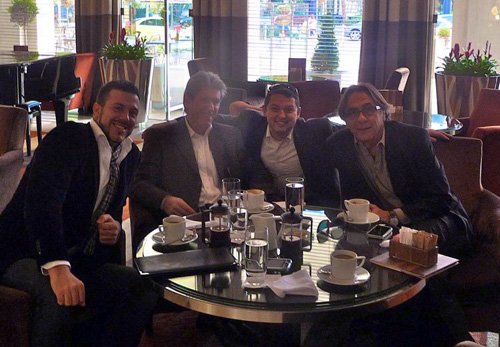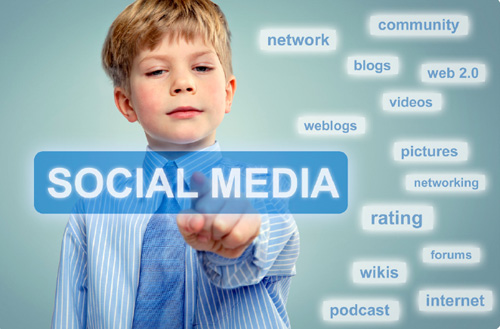NATHANIEL HANSEN, CEO OF THE SOCIALIZERS INTERVIEWS Eleftherios Hatziioannou New Media Manager of s.Oliver and former Social Media Manager for Mercedes-Benz Global.
This is the English version of a feature interview I submitted to Marketing Week Magazine in Greece. The article was published in the May 1-5 2011 issue. The Greek version may be found here.
1. How do enterprises handle the 24-7 nature of online social communities?
This is indeed one of the big challenges businesses have to deal with in a truly globally connected world where people get more and more used to non-stop real-time interaction. When Europe goes to bed Asia rises. There is a 24/7 stream of information and conversations going on which can be of interest for brands and businesses. But business can handle it! How? Like in real life it is all about defining some kind of a rhythm to manage the information and issues. Once you have set up the processes, roles and tools, you just need to be disciplined and do your work day-by-day. And never forget: What counts in real life counts for the social web as well. Over time you create a culture and people understand when to expect an immediate answer and when it can take some time. Communities are smart enough to understand that even a community manager needs a break. I suggest to everyone involved in social communities to be really open about what they can offer and what not. One solution could be defining a “netiquette”, which includes basic rules and guidelines about what people can expect from you and when. Like the “old school” signage at the doorstep of your shop.
2. What criteria do you use in discovering technical solutions for social campaign management and internal facing social solutions?
It depends on what you are looking at and in which phase of your social media engagement you are in. It is an evolutionary process after all. Let’s have a look at “web monitoring”. I suggest that if you are just getting started you do a lot of manual work: reading through comments, searching for tweets related to your company and also creating lists of the blogs which are interesting for your business and subscribing to them. You could organize relevant blogs with tools like Google reader for example. There are a lot of other free tools, e.g. Twitter search, to start with.
However, once you grow and start doing more activities it makes sense to look into professional monitoring tools in order to manage the amount of topics and also being able to analyze and report to your management. I recommend looking at different tools and deciding which one fits your needs best. It doesn’t mean that the expensive solution is also the best. What I definitely prefer are tools which allow you to not only have a “radar” system in place but to work with your findings by transferring them into your internal collaboration space. Think about reading a critical or false statement in a blog which you want to share with your PR colleagues who decide whether to make an official statement or not. The more you open up for the online dialogue the more you want to assign tasks with just a few clicks. Other than that simplicity is king! You want to make it easy for your co-workers to embrace the “change”.
3. What goals are realistic when managing social communities and how do excellent community managers succeed?
Behind every blog, account and profile there is a human being with basic needs: The need to be heard. The need to be appreciated. The need to be part of something greater than himself/herself. An excellent community manager understands these needs. He acts like a real friend. If you want to be a good community manager just think of how relationships and friendship works in normal life. He is the “real deal”. He is not faking anything. He is like a bridge between the inside and the outside of the company translating the language and culture in a way that it can be understood in both directions. He is a strong communicator with excellent social skills. A real champion talks with and not to the community. He filters topics according to their relevance for his audience and balances between company’s and the community’s interests. And last, but not least, he always keeps his promises and openly corrects mistakes. Belive it or not: Communities forgive when you are open about your mistakes. And who’s perfect by the way?!
4. How would your strategy differ when managing social media outposts and a branded community?
The biggest difference would be that in a branded community – which is more of a private thing – you can do more and dive deeper into user engagement. People sign up – with all the data you need to know to be safe- because they really want to be in touch with you. In general it is more of a “trusted” environment where you can engage on a deeper level. Look at it like a VIP lounge in a club. Members feel special but also expect a more “exclusive” treatment. It is more difficult to reach a broad audience if you are not a company like Apple or Google who managed to build huge audiences and communities around their excellent products and services giving special benefits to loyal users, e.g. like testing new devices first or using services before the official launch. I like the concept of branded communities especially in the B2B space where you want to have a certain level of confidentiality or privacy.
It is a different story to build and manage a community on a open and massive platform like Facebook for example. There is definitely less control. People “like” you on the go by simply clicking one button. The same applies to leaving your page again. It is a much faster game and you need to really make sure not to overload the community with your contents and tasks. This applies to formats, tonality as well as lengths of post or videos,etc. related to your communications.
5. What types of insights are most valuable to you from business intelligence gathered via social network analysis? How can such insights also be applied internally in fomenting culture change?
All insights are valuable. The more you know the better you understand the game. At least in this stage of the social media evolution. What is interesting though that in the beginning you appreciate growth in quantitative aspects. “We grew by 1000 fans in Facebook over the past week”, “we have 500 new followers on twitter this month”, “we served 1.000.000 impressions with our campaign”. This numbers definitely help creating awareness and build momentum in the beginning because we were used to measure success in such facts (e.g. CPM – cost per mille). However, I find it much more important to look into the qualitative aspects as well. And in this regard we are still at the very beginning! There are no broadly applied KPIs yet which make your performance comparable. But anything is possible: Why not measuring service levels based on the amount of complaints coming in in relation to problems solved on Facebook? Why not comparing ratio of positive mentions to negative mentions on twitter in comparison to the last month to understand customer satisfaction levels? I guess it is pretty clear what I want to say. Social media is more than just a growing number of fans. Social media is all about real conversations taking place. And there are tons of valuable data available. Think about customer feedback or suggestions related to your product or service. The question is how to handle this inbound stream of information and learning from it?
6. What are your favorite online communities? Why?
My favorite social network is Facebook. I created my profile back in 2006 when I was helping a friend after work to build awareness for a social learning network among students. And back then Facebook was still a platform mainly for students. So we thought it would be the right place to promote this startup.
If I look at Facebook today it amazes me how much they have done right in the course of the past few years. The speed of action. The level of continuous innovation. And of course the massive growth in users and usage. They also managed to hire a lot of talent. I love Facebook for allowing me to connect with my family and friends around the world. They are far away but still so close. I know what`s happening and I can choose how public I want to be. But the social web offers more than Facebook: Think about blogs and how they democratized publishing. Think about twitter and how fast we learn about news in the world today. Or think of the new rising stars who built their audience on YouTube. I find it really amazing to see how technology allows human beings to thrive!
7. You’ve spoken in interviews about culture change internally. Often a period of “cleaning up the organization” prepares the enterprise more fully for social engagement. Speak to the challenges of doing this and also the specific obstacles in a country like Greece.
Change is never easy and you have to make sure that people understand what it is all about. This means that you first have to understand where people are standing right now and what their values are. A colleague in HR in his late 50 with no Facebook profile needs to be addressed differently than a 30-year old colleague in the Marketing team already reading blogs about marketing related issues. What I find valuable is to use the concept of “storytelling” for internal change. Create relevant stories related to the values and challenges of your opponent and also make time to look into and explain the social web. Ask your CEO to “Google” himself or do a live demo of mentions about your company or products. This will work magic – trust me.
Finally, really take your time. Change does not happen over night. Spread the virus, talk to as many people as you can. Walk the talk. You cannot preach change without living it yourself. So spend a lot of time sharing links and information related to social media. Create working groups and inform people about the latest stuff and news. In short: Evangelize and keep walking!
8. Forward looking, what developments in technology do you believe are most relevant to where social communities are headed? How about in relation to where internal corporate culture is headed?
A really interesting question. What is happening right now is that we are going through a complete transformation of our communication and information behavior based on the technologies available and the development of infrastructure (networks, devices, prices for data plans). If you look at the younger generations (digital natives) you see that using various media simultaneously is a normal thing. They got used to real-time information, easy sharing of information, collaboration with friends and all the other technology-driven advances. It has become a natural thing to them. Now, imagine what this means for the “workforce” of tomorrow. Do you think they will come and work for companies which are stuck in the past? Working on ancient soft- and hardware? You cannot expect that they come into the office and forget about all the great tools and features they use in their leisure time.
So besides the cultural change in terms of opening up for online dialogue, embracing social media as a driver for business excellence and stronger customer relations we need to answer the following question: How does the workspace of the future look like? How do we learn from social media about better collaboration? And how can we make work being a playground again for more creativity and innovation? How can we empower our teams to excel?

Eleftherios Hatziioannou (1), Babis Mavridopoulos (2), Nathaniel Hansen (3) and Peter Economides (4) at the Intercontinental Hotel, Athens, Greece. March 2011.
9. What’s your favorite spot in the world?
Generally speaking I love the sea. Especially the Aegean. I guess it has to do with my origin which lies on Rhodes, in the Dodecanese, where my family lives. The deep blue colour, the sandy beaches and the lovely sun in August/ September are truly amazing and work magic if you want to re-charge for business. I will be back in May or June.
Add’l resource: Brian Solis interviews Eleftherios Hatziioannou on Solis TV here.




